| | | OFFLINE | | Post: 19.791
Post: 2.433 | Registrato il: 28/08/2005
Registrato il: 20/01/2009 | Administratore | Utente Veteran | |
|


 PALM SUNDAY - II
PALM SUNDAY - II
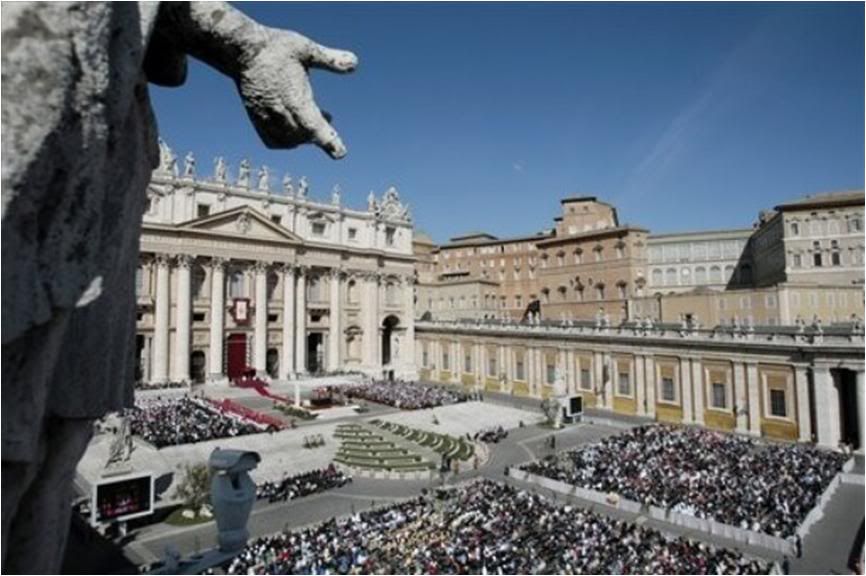
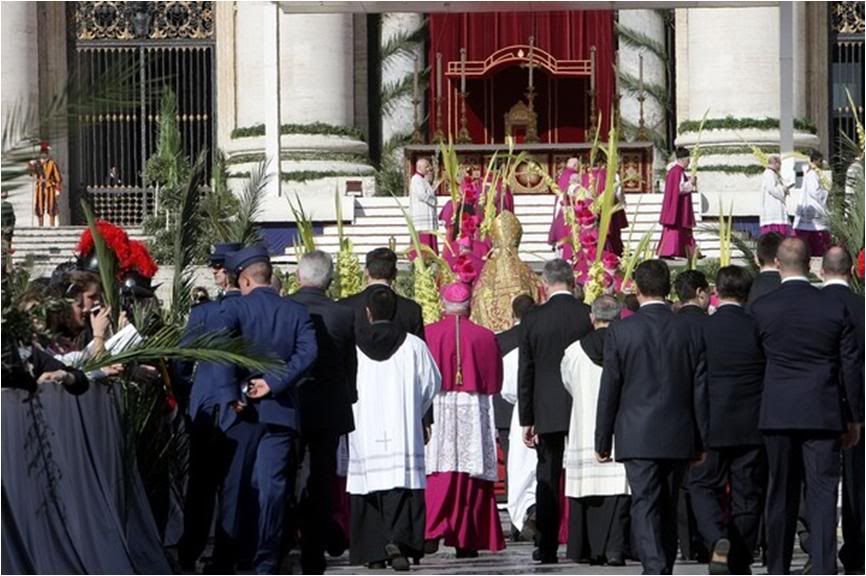
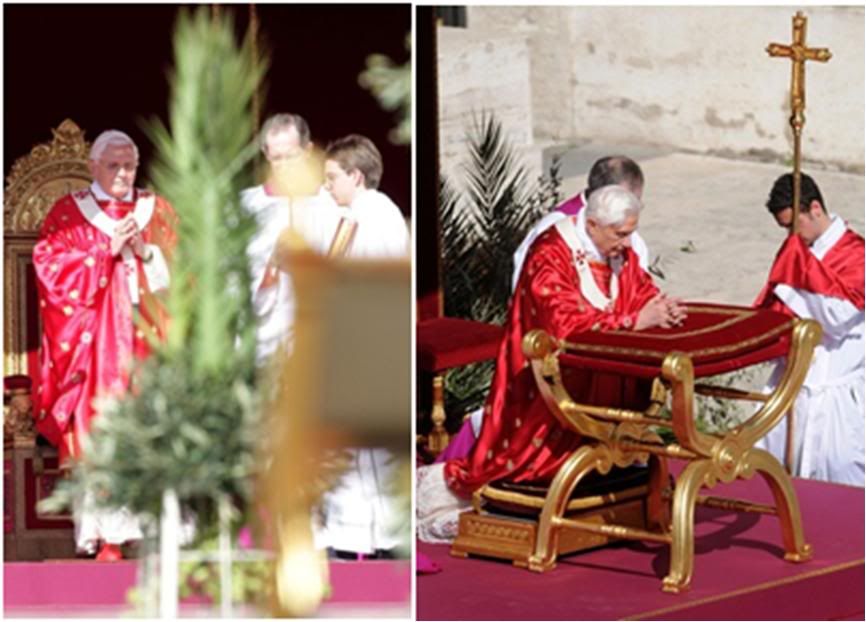
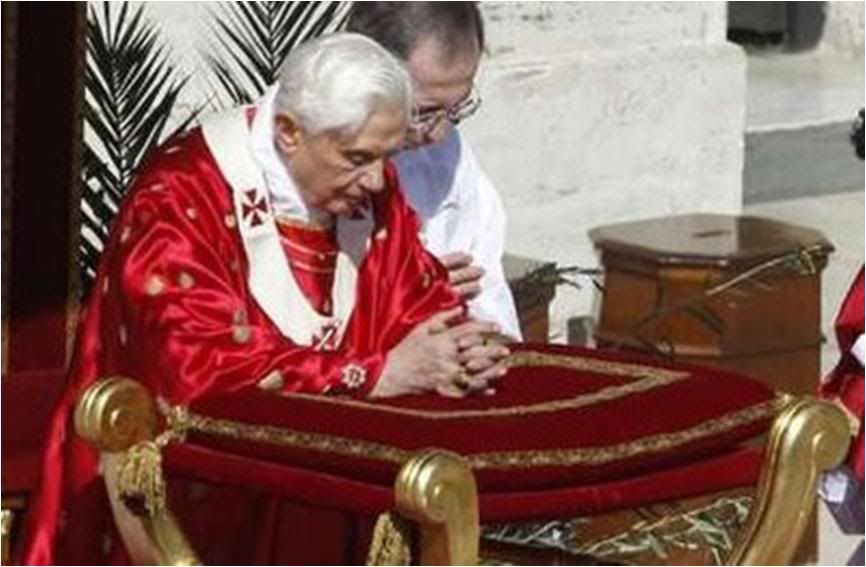
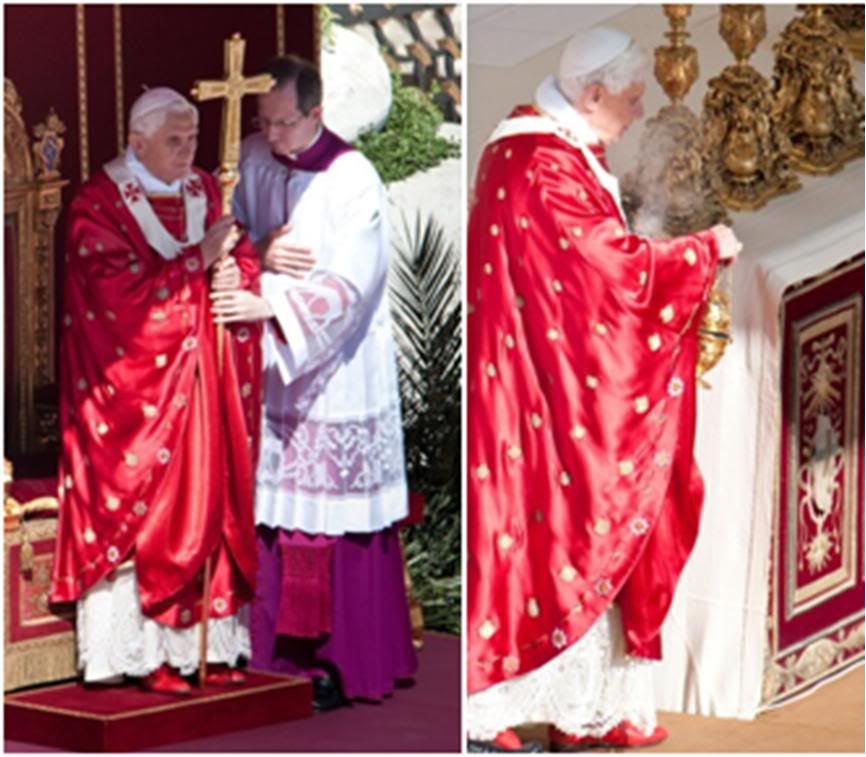
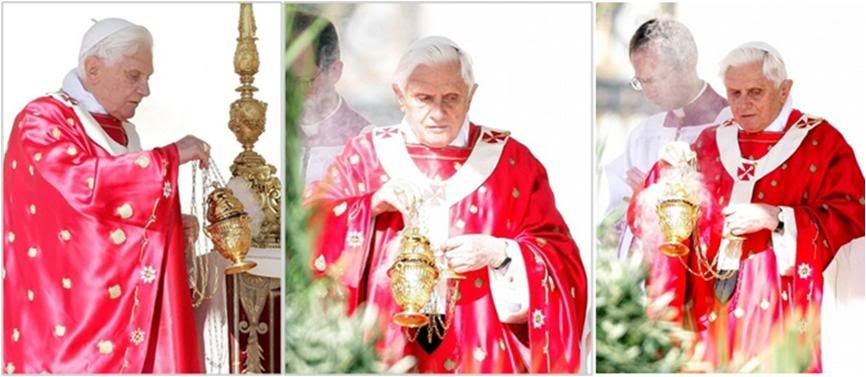 Here is a translation of the Holy Father's homily:
Here is a translation of the Holy Father's homily:
Dear brothers and sisters,
Dear young people:
The Gospel of the Blessing of the Palms, which we heard, gathered here in St. Peter's Square, starts with these words: "Jesus proceeded on his journey up to Jerusalem" (Lk 19,28).
Right at the start of the liturgy today, the Church anticipates its response to the Gospel: "Let us follow the Lord". With this, the theme of Palm Sunday is clearly expressed: It is following.
To be Christian means to consider the life of Jesus Christ as the right way for human beings - the way that leads to the goal, to a fully realized and authentic humanity.
In a special way, I wish to repeat to all the young people on this 25th World Youth Day, that being Christian is a journey, or better yet, a pilgrimage, walking together with Jesus Christ. A journey towards the direction he has shown us and continues to show us.
But what direction is this? How is it found? The sentence from the Gospel offers two indications for this. First, it says that it is an ascent. This has first of all a very concrete significance.
Jericho, where the last part of Jesus's earthly pilgrimage began, is 250 meters below sea level, whereas Jerusalem - the destination of this journey - is 740-780 meters above sea level, an ascent of almost a thousand meters.
But this external way is above all an image of the interior movement of existence that takes place when we follow Jesus: it is an ascent to the true height of the human being.
Man can choose an easy way and avoid any effort. He can also descend to the low, the vulgar. He can sink into the swamp of lies and dishonesty. But Jesus walks ahead of us, and his way is upward. He leads us to what is great, pure; he leads us to the salubrious air of the heights: towards a life that is in accordance with truth; towards courage which does not let itself be intimidated by the chattering gossip of dominant opinions; towards patience which supports and sustains the other.
He leads us towards being available to those who suffer, to those who are abandoned; towards faithfulness to stand by the other even when the situation makes that difficult. He leads us towards the readiness to bring help; towards goodness which is not disarmed even by ingratitude. He leads us to love - he leads us to God.
"Jesus proceeded on his journey up to Jerusalem". If we read these words of the Gospel in the context of Jesus's entire journey on earth - a way which he will continue until the end of times - we can discover several levels in the identification of his destination as Jerusalem.
Naturally, one must understand it simply as the place Jerusalem: the city in which was found the Temple of God, whose uniqueness must be attributed to the uniqueness of God himself.
This place name therefore immediately announces two things. On the one hand, it says that there is only one God in all the world, and that he surpasses immensely all our places and times - the God to whom all creation belongs. He is the God whom all men are seeking in their most intimate depth and about whom everyone in some way has some knowledge.
But this God gave himself a name. He let himself be known to us. He started a story with men. He chose a man, Abraham, as the starting point of this story. The infinite God is at the same time the God who is near us. He, who cannot be enclosed in any edifice, nonetheless wishes to dwell in our midst, to be totally with us.
Jesus, together with pilgrim Israel, is going up to Jerusalem - he is going to celebrate Passover with Israel: the memorial of the liberation of Israel - a memorial which, at the same time, is always hope for the definitive freedom which God will give.
Jesus is going to this feast knowing that he himself will be the Lamb in which will be fulfilled what the Book of Exodus says: a lamb without blemish, male, who at sunset, before the eyes of the children of Israel, would be immolated 'as a perennial ritual" (cfr Ex 12,5-6.14).
Finally, Jesus knows that his life will go on beyond - it will not end on the Cross. He knows that his way will tear away the veil between this world and the world of God; that he will ascend to the very throne of God and will reconcile God and man in his body.
He knows that his resurrected body will be the new sacrifice and the new Temple; that around him, from the ranks of angels and saints, the new Jerusalem in heaven will take form, which is also already on earth, because through his Passion, he will have opened the frontier between heaven and earth.
His way leads far beyond the summit of Temple Mount to the height of God himself: this is the great ascent to which he invites us all. He remains always near us on earth and is always near God. He leads us on earth and beyond earth.
Thus, the amplitude of Jesus's ascent makes visible all the dimensions of our following him,the goal to which he wants to lead us: up to the heights of God, to communion with God, to being-with-God. This is the true goal, and communion with him is the way.
Communion with Christ is to be on a journey, a continuing permanent ascent towards the true height of our calling. Walking together with Jesus is at the same time always a walking together of the 'us' who want to follow him. He introduces us into this community.
Because the journey towards true life, to being a human being who conforms to the model of the Son of God, Jesus Christ, surpasses our own powers, this journeying together is also always being borne along. We find ourselves, so to speak, roped together with Jesus Christ, together with him in the ascent towards the heights of God.
He draws us along with him and sustains us. And it is part of following Christ to let ourselves be part of this being roped together, to accept that we cannot do this by ourselves. Part of following him is this act of humility, of entering into the 'us' of the Church, holding on to the rope, the responsibility of communion - and not pulling away out of obstinacy and conceit.
Believing humbly with the Church, being held firmly together in the ascent towards God, is an essential condition of following Christ. Part of being together is also not behaving like masters of the Word of God, not to run after a false idea of emancipation.
The humility of 'being with' is essential for the ascent. Part of it is also that in the Sacraments, we always allow ourselves to be taken by the hand anew by the Lord; that we allow ourselves to be purified and corroborated by him; that we accept the discipline of the ascent even when we are tired.
Finally, it must be said yet again: In the ascent of Jesus Christ towards the heights, the Cross is part of this ascent towards God. Just as in the events of this world, one cannot achieve great results without renunciation adn hard exercise, just as the joy in a great discovery of knowledge or of a true functional ability is linked to discipline, to the effort of learning, in the same way mankind is linked to communion with him who ascended to the heights of God through the Cross. In the last analysis, the Cross is the expression of what love means: that only he who loses himself, finds himself.
Let us sum up: following Christ requires as a first step to wake ourselves up to the nostalgia for authentic human 'being' and thus, to wake up to God.
It then requires that we join the roped gathering of those who are making the ascent, in the communion of the Church. In the 'we' of the Church, we enter into communion with the 'you' of Jesus Christ on the road towards God.
It is also asked that we listen to the Word of Christ and that we live it - in faith, hope and charity. Thus we journey together towards the definitive Jerusalem, but even now, we find ourselves there, in some way, in communion with all the saints of God.
Therefore, our pilgrimage in the following of Christ is not towards any earthly city but to the new City of God which grows even amidst this world. The pilgrimage towards the earthly Jerusalem, nonetheless, can be, even for us Christians, a useful element for the greater journey.
I myself find three meanings linked to my pilgrimage to the Holy Land last year. Above all, I had thought that on such an occasion, we might experience what St. John describes at the start of his first Letter: that what we have heard, we can, in some way, see and touch with our hands (cfr 1 Jn 1,1).
Faith in Jesus Christ is not a legendary invention. It is based on a story that truly happened. And we can say that we are able to contemplate and touch this history.
It is moving to be in Nazareth at the spot where the Angel appeared to Mary and conveyed to her the task of becoming the Mother of the Redeemer.
It is moving to be in Bethlehem at the place where the Word, having become flesh, came to dwell among us; to set foot on the holy ground where God became man and child.
It is moving to climb the ladder to Calvary to the place where Jesus died for us on the Cross. And finally to be in front of the empty tomb - to pray where the Holy Body rested, and where, on the third day, the Resurrection took place.
To follow the external paths that Jesus trod should help us walk more joyously and with a new certainty along the interior road that he showed us and which is he himself.
When we go to the Holy Land as pilgrims, we also go - and this is the second meaning - as messengers of peace, with prayer for peace; with the strong appeal to everyone to do - in that place [Jerusalem] which has in its name the word 'peace' - everything possible so that it may truly become a place of peace.
Thus, this pilgrimage is at the same time, as a third aspect, an encouragement for Christians to stay in the land of their origins and there, to engage themselves intensely for peace.
Let us turn back to the liturgy of Palm Sunday. In the prayer to bless the palms, we pray so that in communion with Christ we may be able to bear the fruit of good works. From a mistaken interpretation of St. Paul, there has developed repeatedly in the course of history and even today, the opinion that good works are not part of being Christian, and that in any case, they would be insignificant for the salvation of man.
But when Paul says that works cannot justify man, he is not opposing the importance of acting right, and when he talks of the purposes of the Law, he does not declare the Ten Commandments to have been surpassed and irrelevant.
It is important to point out that by the term 'Law' he does not mean the Ten Commandments, but the complex lifestyle to which Israel was obliged in order to protect herself against the temptations of paganism.
But now, Christ had brought God to the pagans, and this form of distinction was not imposed on them. The only Law that comes to them is Christ. And this means love for God and for one's neighbor - and everything that comes with that love. Part of it are the Commandments themselves read in a new and more profound way, starting from Christ - the Commandments which are nothing but the fundamental rules of true love.
First of all, and as a fundamental principle, the worship of God, the primacy of God expressed in the first three commandments. They tell us that without God, nothing can happen in the right way. Who this God is and how he is, we know from the person of Jesus Christ.
What follows next is about the sanctity of the family (the fourth Commandment), the sanctity of life (fifth); the order of matrimony (sixth), the social order (seventh), and the inviolability of truth (eighth). All this is of the greatest relevance today, and even in the sense of St. Paul - if we read all his Letters.
"To bear fruit with good works": At the start of the Holy Week, let us pray to the Lord that he may always give all of us ever more of this fruit.
At the end of the Gospel for the blessing of the palms, we hear the acclamation with which the pilgrims greet Jesus at the gates of Jerusalem. It comes from Psalm 118(117), which originally, the priests proclaimed to the pilgrims coming to the Holy City, but which had become an expression of the Messianic hope: "Blessed is he who comes in the name of the Lord" (Ps 118[117], 26; Lk 19,38).
The pilgrims saw in Jesus the Awaited One, who comes in the name of the Lord. And according to the Gospel of St. Luke, they inserted a word, to say: "Blessed is he, the King, who comes in the name of the Lord".
And they continue with an acclamation that recalls the message of the Angels at the Nativity, but they modify it in a way that makes us reflect. The angels had spoken of the glory of God in the highest and peace on earth for men of good will.
The pilgrims at the entrance to the Holy City say: "Peace in heaven and glory in the highest heavens". They know very well that on earth, there is no peace. And they know that the place of peace is heaven - they know that part of the essence of heaven is that it is a place of peace.
Thus, this acclamation is one of profound sorrow but at the same time, a prayer of hope: that he who comes in the name of the Lord may bring to earth what is in heaven. His kingship becomes the kingship of God, the presence of heaven on earth.
The Church, before the Eucharistic consecration, chants the words of the Psalm with which Jesus was greeted before entering the Holy City: It greets Jesus as the King who, coming from God, comes among us in the name of God.
Even today this joyous greeting is always both supplication and hope. Let us pray to the Lord so that he may bring heaven to us: the glory of God and peace among men. We understand this greeting in the spirit of the request we make in the Our Father: "thy will be done on earth as it is in heaven".
We know that heaven is heaven, the place of glory and peace, because there, the will of God reigns totally. And we know that earth is not heaven as long as in it, the will of God is not realized. Therefore, let us greet Jesus who comes from heaven and pray that he may help us to know and do the will of God. May the kingship of God enter the world that we may be filled with the splendor of peace. Amen.
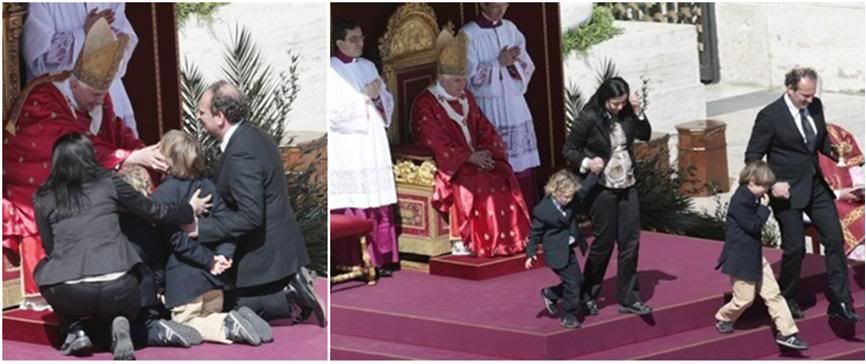
At the end of the Mass, the Holy Father led the recitation of the Angelus, delivering these words before the prayers:
As we end this celebration, our thoughts must go to Palm Sunday 25 years ago. It was 1985, which the United Nations had declared the Year for the Youth. The Venerable John Paul II wished to avail of the occasion and, in commemorating the entry of Jesus into Jerusalem to the acclamation of his young disciples, he began the observance of World Youth Day.
Since then, Palm Sunday has acquired this feature, which every two or three years is also manifested in large international gatherings that have traced a kind of youth pilgrimage throughout the entire planet in the name of Jesus.
Twenty-five years ago, my beloved predecessor invited young people to profess their faith in Christ "who had taken on himself man's cause" (Homily, March 31, 1985, nn. 5,7, Teachings VIII, 1(1985), 884,886).
Today, I renew this appeal to the new generation to bear witness with the gentle and luminous power of truth so that men and women of the third millennium will not lack its most authentic model, Jesus Christ.
I entrust this mandate in particular to the 300 delegates of the International Youth Forum who have come here from around the world under the auspices of the Pontifical Council for the Laity.
In English, he said:
I greet all the English-speaking pilgrims and visitors at this Angelus, especially the young people present who are celebrating the twenty-fifth World Youth Day.
Today we also begin Holy Week, the Church’s most intense time of prayer and reflection, by recalling Jesus’s welcome into Jerusalem by the children. Let us make their joy our own, by welcoming Christ into our lives, our hearts and our families.
Upon you and your loved ones, I gladly invoke the strength and peace of our Lord Jesus Christ.
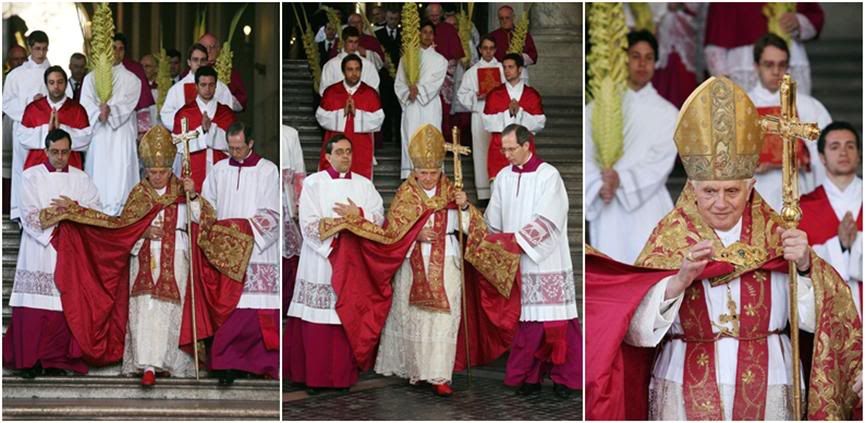
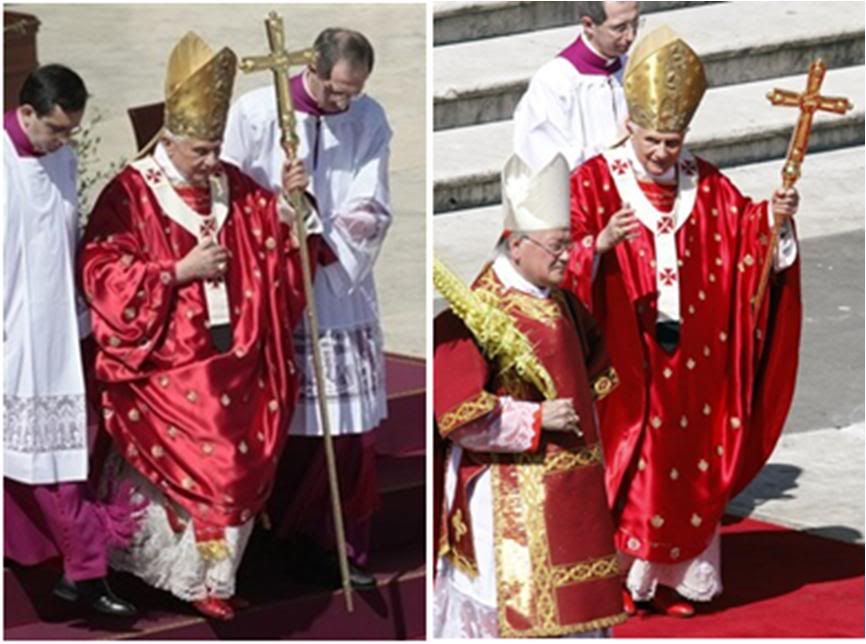
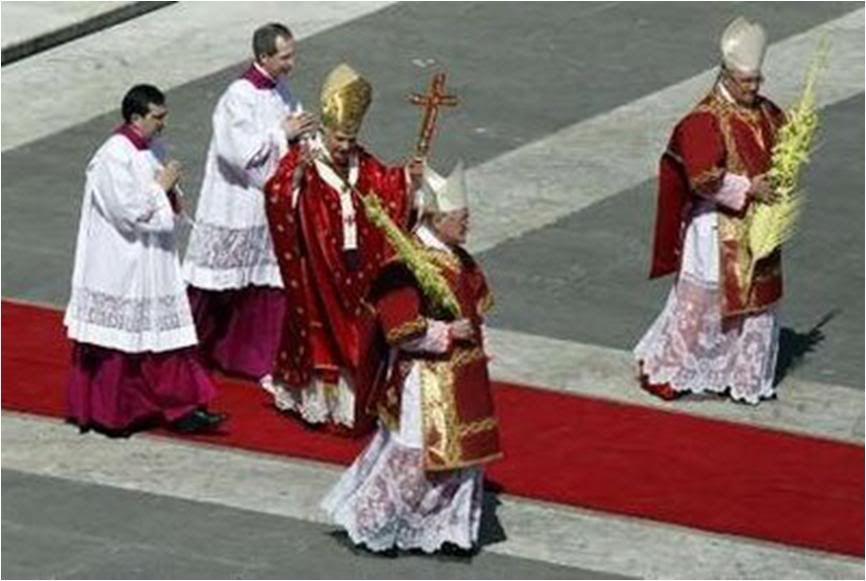 All those who wish ill of the Holy Father and think that because they so, it will be so, should take a lesson from the crowds of faithful who were present Thursday night and again Sunday morning in St. Peter's Square. All the headlines and picture captions posted by the news agencies insist that the Holy Father is 'besieged' - yes, he is besieged with malevolence by them alone, but protected by the affection and prayers of the faithful, and the grace of God.
All those who wish ill of the Holy Father and think that because they so, it will be so, should take a lesson from the crowds of faithful who were present Thursday night and again Sunday morning in St. Peter's Square. All the headlines and picture captions posted by the news agencies insist that the Holy Father is 'besieged' - yes, he is besieged with malevolence by them alone, but protected by the affection and prayers of the faithful, and the grace of God.
The faith of simple folk - who do not need the media to tell them what to think - has the strength of purity. And this is one of the reasons why the gates of Hell will not prevail against the Church Christ founded nor against his Vicar on earth.
[Modificato da TERESA BENEDETTA 30/03/2010 10:50] |